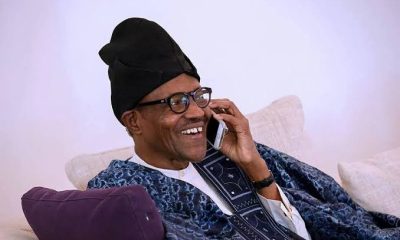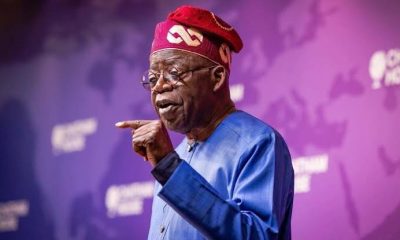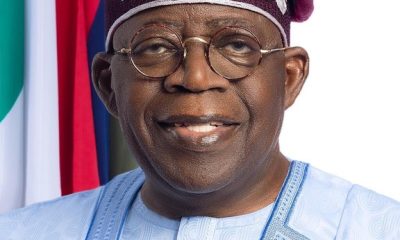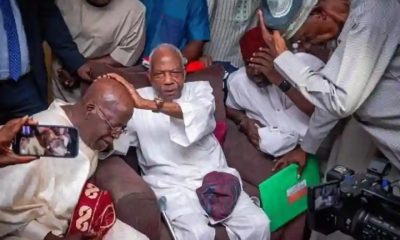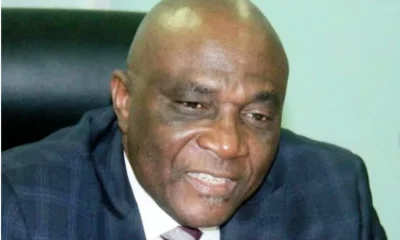Headline
Ohaneze demands justice, fairness in President Tinubu’s appointments

Ohaneze Ndigbo Worldwide, the pan Igbo sociocultural group, has demanded justice, fairness and equity in President Bola Tinubu’s appointments.
The group said they were disturbed over the current appointment of ministers in Nigeria by the president, in which South-East had only five ministers while other zones had nine and even 10 ministers.
Chief Emmanuel Iwuanyanwu, the President General, Ohanaeze Ndigbo Worldwide, made the disclosure in a statement issued on Thursday in Enugu.
According to Iwuanyanwu, Ohanaeze Ndigbo feels that it is unfair and unjust as they believe in one united Nigeria which can only be achieved in an atmosphere of fairness, justice and equity.
“We therefore demand justice, fairness and equity for every ethnic group in Nigeria including the Igbo.
“Recall that the states and geopolitical zones were created by the military administrations. All honest Nigerians know that the Igbo did not play much part during this exercise.
“As a result, the South-East was shortchanged with five states while other zones have minimum of six states.
He added that the situation had placed the South East in a very difficult position, politically, economically and socially.
“Our political power has been reduced as we have a few senators and also in the House of Representatives; governors, house of assembly and local governments,” he said.
The president general added that in federal revenue allocation, the region was denied the revenue that came on the basis of states as well as federal board appointments and other resource distributions which they were strategically shortchanged.
“We wish to observe that this situation was not caused by the current administration but we however, appeal to His Excellency, Mr Bola Ahmed Tinubu, to help us remedy the situation and restore justice, equity and fairness in Nigeria.
“We pray the Almighty to bless and prosper our country, Nigeria and give our leaders the wisdom and knowledge to steer the ship of Nigerian nation to peace, happiness and prosperity for all Nigerians irrespective of ethnicity, creed and political persuasion,” he prayed.
Headline
Fagbemi warns against obstructing EFCC from performing its lawful duty

The Minister of Justice, Lateef Fagbemi, SAN has warned against obstructing the Economic and Financial Crimes Commission (EFCC) from carrying out its lawful duty .
Fagbemi’s warning is contained in a statement in Abuja.
“This is a matter of very grave concern, it is now beyond doubt that the EFCC is given power by the law to invite any person of interest to interact with them in the course of their investigations into any matter, regardless of status.
“Therefore, the least that we can all do when invited, is not to put any obstruction in the way of EFCC, but to honourably answer their invitation.
“A situation where public officials who are themselves subject of protection by law enforcement agents will set up a stratagem of obstruction to the civil and commendable efforts of the EFCC to perform its duty is to say the least, insufferably disquieting’’.
He added that running away from the law will not resolve issues at stake but only exacerbate them.
“Nigeria has a vibrant judicial system that is capable of protecting everyone who follows the rule of law in seeking protection.
“I therefore encourage anyone who has been invited by the EFCC or any other agency to immediately toe the path of decency and civility by honouring such invitation instead of embarking on a temporising self-help and escapism.
“This can only put our country in bad light before the rest of the world’’.
He said institutions of state should be allowed to function effectively and efficiently.
“I stand for the rule of law and will promptly call EFCC, and indeed any other agency to order when there is an indication of any transgressions of the fundamental rights of any Nigerian by any of the agencies’’.
NAN reports that the EFCC had on Wednesday warned members of the public that it was a criminal offence to obstruct officers of the Commission from carrying out their lawful duties.
Section 38(2)(a(b) of the EFCC Establishment Act makes it an offence to prevent officers of the Commission from carrying out their lawful duties. Culprits risk a jail term of not less than five years.
The warning , the EFCC said, became necessary against the background of the increasing tendency by persons and groups under investigation by the Commission to take the laws into their hands by recruiting thugs to obstruct lawful operations of the EFCC.
On several occasions, the anti graft agency said, operatives of the Commission have had to exercise utmost restraint in the face of such provocation to avoid a breakdown of law and order.
Headline
Unknown Gunmen Abduct Channelstv Reporter In Port-harcourt

Some unknown gunmen have kidnapped Joshua Rogers, the ChannelsTV reporter in Port-Harcourt, the Rivers State capital.
Politics Nigeria learnt that Rogers was picked up close to his residence at Rumuosi in Port Harcourt and to an unknown destination by the gunmen around 9pm on Thursday, April 11.
The reporter was driving his official ChannelsTV branded car when the hoodlums accosted, pointed a gun at him and took him away in the same vehicle.
Rogers was said to be returning from his official assignment in Government House after a trip to Andoni for a government event when the incident happened.
Already, the gunmen were said to have contacted his wife and demanded a N30million ransom for bis release.
His cameraman confirmed the incident and appealed to his abductors to set him free unconditionally.

